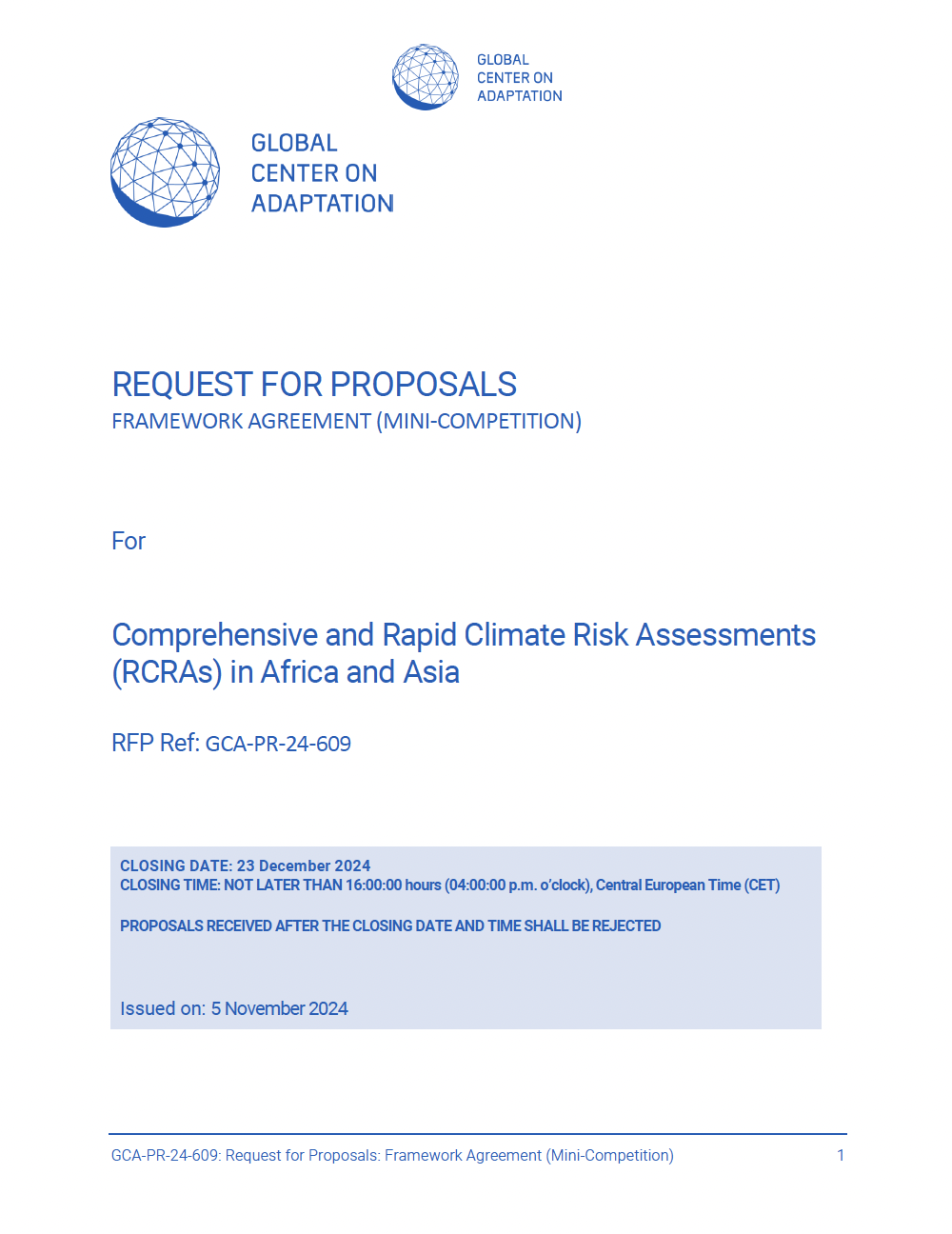INTRODUCTION
Introduction to the Global Center on Adaptation (GCA)
The Global Center on Adaptation (GCA) is an international organization that works as a solutions broker to catalyze action and support for adaptation solutions, from the international to the local, in partnership with the public and private sector, to ensure we learn from each other and work together for a climate resilient future. Adapting to impacts of climate change provides a “win-win” for livelihoods, food security, water supply, health, security, and economic growth. The work of the GCA elevates the visibility and political importance of climate adaptation and facilitates solutions, such as smarter investments, new technologies and better planning to become more resilient to climate related threats. GCA is a rapidly growing organization with offices in Abidjan, Beijing, Dhaka, Groningen, and Rotterdam.
The GCA’s ambitious 2020-2025 business plan and strategy have three pillars:
- Programs: Food Security; Using Nature for more resilient infrastructure; Water for Urban Growth and Resilience; Climate Finance; Youth Leadership.
- Knowledge: Building adaptation knowledge globally through cutting edge products such as the State and Trends in Adaptation Report and the Adaptation Knowledge Portal.
- Advocacy and Awareness: Formulating policy messages to move the global, regional, and local adaptation agendas forward.
Introduction to the Requesting Program
GCA’s Water and Urban Program provides technical assistance for cities and national governments to identify priorities for climate adaptation investment. This is done together with Multilateral Development Banks and other partners that support water services, urban development and informal settlements upgrading.
Comprehensive Climate Risk Assessments typically serve some or all of the following purposes for water services, urban development, and informal settlements upgrading:
- Informing detailed planning and design of investment projects, sector master plans, resilience roadmaps and community resilience investments. As part of this process, adaptation options are prioritized, including nature-based solutions (NbS).
- Development of investment plans, adaptation project concepts, and other actions to enable adaptation financing.
Rapid Climate Risk Assessments typically serve some of or all the following purposes:
- Initiating or advancing a dialogue between city officials and financiers (currently Multilateral Development Banks and Development Banks) towards an urban investment portfolio that is informed by climate risk.
- Building capacity and aligning city decision-makers around a climate adaptation agenda that has clear priorities.
- A precursor for detailed climate risk assessment and resilience options appraisal linked to a specific urban investment.
Tasks and activities
Both rapid and comprehensive climate risk assessments typically comprise of the tasks outlined below. The granularity and level of detail of each task will depend on the objectives and scope of work of individual assignments, which will be specified in each Work Order.
- Climate hazard assessment: For rapid climate risk assessments, key climate hazards are typically analyzed from secondary data and/or global data (e.g., major databases and credible sources), and from interviews and discussions with key stakeholders. For comprehensive assessments, remote sensing and other data from monitoring stations are also used to estimate parameters needed for hydrological and hydraulic modeling as appropriate.
- Vulnerability assessment: Analysis of the sensitivity and adaptative capacity of systems (e.g., places, people, institutions, infrastructures, including assets, systems, services) when exposed to key hazards. The impacts of hazards on systems are prioritized and mapped to identify hotspots. For some assignments, detailed analysis is done for hotspots. In some cases, methodologies may be adapted to place emphasis on informal settlements and vulnerable groups.
- Climate risk assessment: Task 3 combines outputs of tasks 1 and 2 and aims to produce risk maps and/or risk matrices (which can be for, but not limited to, sectors, sub-sectors, infrastructures, assets, services and service chains, urban areas, and/or communities).
- Climate adaptation and resilience options assessment: Task 4 builds on the outputs of tasks 1, 2, and 3, and aims to prioritize climate adaptation and resilience options/solutions to address climate risks (which can be of, but not limited to, sectors, sub-sectors, infrastructures, assets, services and service chains, urban areas, and/or communities).
- Climate risk dialogues and stakeholder engagement: The multiple purposes of climate risk assessments (e.g., influencing the design of an investment project or influencing upstream investment planning), the uniqueness of clients (cities, national governments, and communities), and other project and location contextual factors (society, economy, nature, informality) make stakeholder and community engagement essential for all tasks. Thus, this task is fully integrated into tasks 1 to 4 but is described separately given its importance.
Submission of the Proposal
If you are interested in participating in this Request for Proposal, you are requested to submit your proposal to the submission link: https://gcaorg-my.sharepoint.com/:f:/g/personal/chisala_mutale_gca_org/EgCoM8z4x0lHkKiB-DGpwZIBr1gwcmi28kSnJ_kklroObA no later than 23 December 2024, 16:00:00 hours (04:00:00 p.m. o’clock), Central European Time (CET) (hereinafter referred to as “the closing date and time”).
Bidders are cautioned that the timing of submission is based on when the proposal is received by the GCA, not when a proposal is submitted by a bidder. As transmission can be delayed due to file transfer size, transmission speed or other technical factors, bidders should plan to submit proposals well in advance of the Submission Deadline to avoid submitting late due to technical issues. Bidders submitting near the Submission Deadline do so at their own risk.
Proposals received after the closing date and time will be rejected. GCA will confirm receipt of proposals within 24 hours from the closing date and time. Bidders that do not receive this confirmation must contact GCA within 48 hours from the closing date and time. After 48 hours from the closing date and time, GCA shall not respond to any queries related to whether a bidder’s proposal was received.
Please download the full RFP for more information.
GCA RFPs may be republished in accordance with the Creative Commons Attribution – NonCommercial – NoDerivatives 4.0 International Public License, and in accordance with our Terms of Use.
Answers to clarifying questions
Sign up for our procurement mailing list to receive updates when new notices are posted
